For 50 years Korea War Veterans who served in the Korea Operational Area between 28 July 1953 and 19 April 1956 were denied (1) a Returned from Active Service Badge (RASB), (2) an Active Service Medal and (3) those who died from that service were not honoured with their names on Honour Rolls and Memorials and in some cases, were not provided with war graves. All claims were rejected.
2003 - The Korea War Veterans Association of NSW (KWVANSW) established a committee to fight for recognition, the Korea War Veterans Australia Recognition Committee (KWVARC)
June - 2005 The Post -Armistice Korea Review Committee (PAKRC) commenced its work. It handed down its findings in December 2005.
July 2007- The Howard government rejected most of its recommendations.
2007 - The Labor Policy for Veterans’ Affairs stated that, on assuming office, it would implement all the recommendations of the PAKRC.
October 2008 – The Rudd government approved the PAKRC recommendations.
Welcome news from France on 24 October 2008
From France on 24 October 2008 the Hon. Mike Kelly, AM, MP, Parliamentary Secretary for Defence Support (PSDS) interrupted his busy schedule and, as promised, telephoned Mr. Bob Morris, President KWVARC, and announced:
“Mr Kevin Rudd, the Prime Minister, has finally approved our submission on your behalf and all Korea War Veterans who served in Korea between 28 July 1953 and 19 April 1956 will each be issued with
a. the Returned from Active Service Badge, and
b. a specially struck Australian General Service Medal for their Korea Service, and
all those who died as a result of that service will be appropriately recognized as war caused deaths with their names added to an Honour Roll at the Australian War Memorial (details of the latter to be advised as soon as possible), and
c. a Media Release will be issued probably on 30 or 31 October 2008”
Success at Last – Media Release – Historic Breakthrough
On 29 October 2008 as promised the Hon. Dr.Mike Kelly, MP, (PSDS) made a media release 052/2008 titled: “Implementation of the Korea Post-Armistice Service Review”
It states in part:
1. The DoD “will shortly make administrative arrangements to issue the RSAB to eligible veterans” and
2. “The Government would seek Royal Assent to create a new medal to recognize those who served in Post-Armistice Korea” – the “Australian GSM – Korea”
After more than five years of bitter fighting by his committee for recognition of these Korea War Veterans, against entrenched opposition from bureaucrats, politicians and others this was welcome news indeed.
As Bob’s wife, Mavis, is not well and he and she are about to embark on a cruise he has asked me to prepare this for the KWVA(NSW), Editor Phil Mann.
It is now more than 55 years since that war service commenced. Your readers may be interested to know why it has taken so long to finally achieve this belated historic recognition.
With the Newsletter deadline fast approaching I have prepared it in some haste – please excuse any errors or omissions. The contents have been approved by the KWVARC and some members of the KWVA (NSW).They are based on a wealth of evidence.
Some relevant Background
Following the signing of an Armistice on 27 July 1953, Australian Servicemen continued to be allotted to and served in Korea until 1957.The Armistice specified that a Peace Treaty would be signed in 90 days. This did not happen. Technically both sides are still at war. Ever since more than 1.5 million troops have faced each other on instant alert on both sides of the 155 mile DMZ. Over 40,000 incidents have taken place. U.S.A. still has about 40,000 troops stationed there.
Those who served there in the Korean Operational Area between 27 July 1953 and 19 April 1956 in accordance with consistent, binding, Federal legislation and considerable other supporting documents, reports, Governor – General proclamations etc. were clearly on “Operational Service”, “Active Service”, “Qualifying Service”, “War Service”, and “Hazardous Service” in accordance with considerable Federal legislation tabled, debated and approved in the “spirit and intention of the acts as expressed in the words of the Parliament”
Such supporting evidence is contained in, at least:
a. The Imperial Act 1881,
b. The Defence Act 1903,
c. The Defence Force Discipline Act 1982,
d. The Repatriation Act 1920 (as amended) including sections 107A and 107B,
e. The Veterans Entitlement Act 1986 including schedule 2 and definitions in section 5,6,and 7 (as amended),
f. an official government website which lists all of their names as “Korea War Veterans” and from which can be downloaded a document for each one certifying them as “War Veterans.”
c. a Defence document titled “Eligible Service Areas, Dates and Instruments”(see pages 9 and 10 for Korean service),
d. Many Military Board Instructions and similar documents for the RAN and RAAF,
e. what is regarded as the most thorough and best ever examination of the Repatriation system – the Toose Report (1975),
f. The Mohr Report (2003) and the Clarke Report - both of which were undertaken to examine the anomalies in the CIDA Report (1994) – which was the only one of those 4 reports not chaired by a distinguished, legally trained and experienced chairman,
g. a proclamation by the Governor General, FM Sir William Slim in 1956,
h. The recommendations in the Clarke Report that all those who served after 19 April 1956 (not included in the KWVARC claim) be accepted as being on “non warlike” service (as distinct from those who served up to 19 April 1956), and
i. The specific definitions in each of the 3 Korean War Health study reports which lists all those who served between 27 June 1950 and 19 April 1956 as “War Veterans” and bases its dramatic results on that fact.
Denial of Legal Rights and a Lasting Legacy of Bitterness and Betrayal
When those Korean War Veterans who were allotted to and served in the Operational Area (see VEA 1986, schedule 2, Item 1) returned to Australia they were thus astonished and deeply distressed to find that :
a. they were not granted the RASB (without which the RSL, at that time, denied them RSL membership) – causing a lasting legacy of bitterness for the past 55 years,
b. the majority of whom were denied an active service medal – using a variety of ever changing excuses and their own unsubstantiated interpretations of key words – most all of which do not stand up to close examination and/or are irrelevant – which heightened their sense of betrayal and bitterness,
c. such bitterness was further exacerbated when, despite many of them receiving their discharge certificates which stated details of their “active service” their claims were rejected,
d. as it was when on downloading a document from a government website certifying that they were “War Veterans” – but such were ignored and,
e. a further sense of anger developed as it became known that all those who had died (at least 18) as a result had not been officially recognized as “War caused deaths” nor included in Honour Rolls or Memorials – regarded widely as “ a national disgrace”.
The Forgotten War Veterans of “The Forgotten War”
It is therefore no wonder that for the past 55 years those veterans and their families developed a lasting legacy of bitterness at what they perceived as a betrayal of their legal entitlements.
This, at least in part, may account for the alarmingly high rate of suicide of Korea War Veterans – a suicide rate greater than those of Veterans of both WWII and Vietnam conflicts.
For decades all attempts by individuals and ex-service bodies to remedy this situation came to naught.
Establishment of the Korea War Veterans of Australia Recognition Committee (KWVARC)
In 2003, after years of rejection of their justified requests based on consistent, binding, long lasting Federal legislation the KWVA (NSW) decided to establish the KWVARC to fight on behalf of all Australians Korea War Veterans.
Mr Bob Morris was elected President and Mr Rod Coupland Secretary.Committee members and others who assisted greatly in research included Mr Jack Casey and Arnold Pepper who visited the UN cemetery in Pusan (now Busan) Korea to trace the deaths of those who had died as a result of their service in Korea and whether they were buried in war graves and had their names on memorials and honour rolls, - including those at the Australia War Memorial. Of the 18 such veterans researched only 2 had their names on the AWM honour roll as “War caused deaths”.
Other committee members included Mick Kohlhoff, Allan Evans, Tom Stewart, John Mather, Allan Hunter, Peter Poynter, Ben Link, John Casper (since deceased), Kevin Cooke, Bernie Devine, John Collins, Col Berryman and Rick Madigan,
The committee dispatched 1200 submissions to RSL sub branches & ex-service associations (including those of Korea War Veterans). As a result over 6000 signatures and 482 submissions were obtained in support.
The KWVARC Claim.
The claim submitted on behalf of some thousands of Korea War Veterans who, together with their units were “allotted for duty to” and “Served in the Korea Operational Area” between 28 July and 19 April 1956 (Repatriation Act 1920 and VEA 1986 (Schedule 2) was for recognition of their legal entitlements for inter-related matters:
1. Issue of the Returned from Active Service Badge (RASB)
2. Acceptance of all deaths to that service as “War caused deaths”, entitlement to war graves and inclusion of their names on memorials, Honour Rolls in at least the Australian War Memorial (AWM) and the UN Cemetery at Pusan (now Busan).
3. Issue of the AASM 1945-75 with clasp Korea.
Some funding was provided by Bomaderry, Huskison and other RSL sub branches and KWVA (NSW) and from many individual veterans.
Requests submitted to the Ministers Assisting the Minister for Defence (MAMD) Donna Vale, MP and Mal Brough, MP were rejected.
The national body of the RSL was initially not prepared to support their campaign.
During the next 5 years those members, often to the detriment of their own health and the well being of their wives undertook a detailed examination of a wealth of supporting evidence, held many meetings, helped in the preparation of submissions and other tasks.
The President, Bob Morris, and Secretary, Rod Coupland, undertook a very heavy, continuous workload (much at their own expense) often to the detriment of their own health and the well being of their wives.
Over 9 visits of KWVARC members (and their wives) were made to Canberra to discuss maters with politicians – all at their own expense.
The committee has had to deal separately with five ministers and their staffs over 5 years
Unjustified Denials by the “ Devious Dodgers”
The KWVARC quickly and increasingly became aware that their task would not be an easy one.
Early requests for relevant ministers to take actions were ignored or rebuffed.
Despite strong support from their local federal and state ministers – Joanna Gash, MP and Shelly Hancock, MP (who raised the issues in NSW State Parliament) the log jam remained.
The first big break through was in 2004 when Fran Bailey, MP replaced Mal Brough, MP as MAMD.
On 29 July 2004 at the request of Joanna Gash, MP, Fran Bailey, MP attended a meeting of 80 Korea War Veterans in Nowra, listened attentively, promised to study their claims and respond.
On 28 September 2004 she appointed an independent working party with Major General Warren Glenny as Chairman and Brigadier Gordon Jones and Ms Colleen Thurgar, (a distinguished nurse from the Vietnam War) as members.
Hopes were high but quickly faded.
It soon became obvious that Ministerial Advisers (MA) in both DOD and DVA, working to their own hidden agendas, were determined to defeat their claims. A study of large paper trails confirms this – using a variety of ever-changing excuses – most or all of which were irrelevant and did not stand up to close scrutiny.
No essential Terms of Reference (TOR) were provided for the working party despite several formal requests from the Chairman.
Major General Glenny who was a wise choice as chairman is a distinguished senior Army officer held in high regard in both the veteran and business community – a man of honour and integrity.
Replacement of Working Party and its Chairman Major General Glenny
After De Anne Kelly, MP resumed responsibilities from Fran Bailey, MP, as MAMD and on the advice of her MA, without the knowledge of or consultation with Major General Glenny, scrapped that working party and replaced it with an independent review committee co-chaired by Rear Admiral Ian Crawford and Mr. Gary Nehl (a retired politician). No essential TOR was provided at that time.
These actions resulted in a large number of written and verbal protests about the selection of the two co-chairman – both of whom had earlier pre-judged the issues negatively.
Terms of Reference
Then began the vital battle for the contents of the TOR
When it became clear that De Anne Kelly’s MA was determined that the TOR, when promulgated, were to be deliberately designed to exclude the vital study of all the supporting, binding, long held Federal legislation and in addition introduced other irrelevant matters, the concerned KWVARC then submitted a letter to De Anne Kelly, MP, MAMD which included as Appendix 1 their recommended essential inclusions in the TOR.
As a result on 23 May 2005 she held a meeting in her office. Present were herself, her MA, Joanna Gash , MP, Walley Stack (adviser to Joanna Gash) and Bob Morris, Rod Copeland and Jack Casey of KWVARC. De Anne Kelly asked her MA whether he had any objection to including the KWVARC recommendations (Appendix 1) he said he had no objections. She then directed him to include all of the contents of “Appendix 1” in the TOR.
It soon became obvious he had no intention of doing so, and ignored her direction.
From 23 May onwards the KWVARC applied pressure to her MA, by phone and emails, to ensure that the contents of their “Appendix 1” were included – all to no effect.
A study of the TOR, belatedly issued, confirmed that its contents were deliberately designed to defeat the KWVARC claims, including the absence of addressing all the essential relevant Federal Legislation.
The Post Armistice Korean Service Review Report
The PAKRC finally began its task on 14 June 2005, working to the biased TOR prepared by the MA.
Submissions were called for and visits were made to all states.
Their report was tabled on 6 December 2005.
The two co-chairmen and the PAKRC committee are to be congratulated on their recommendations.
My Submission
On 5 July 2005, as requested, I forwarded to the Secretary a 12 page submission providing relevant background, comments on the TOR and a wealth of information on all the Federal legislation etc which was consistent, long standing and binding.
The contents were supported by several knowledgeable legal professionals and the KWVARC.
Precedence of Federal Legislation over DoD Administrative Processes
I stated that in reaching its conclusions on the first two matters (RASB and Medal) the PAKRC should be bound by all the Federal legislation which should take precedence, on legal grounds, over any administrative process followed by DoD or its Medal committee.
This vital matter was not included in the ToR as requested, was not properly or adequately addressed (if at all) by either the PAKRC or in the legal opinion it obtained.
Legal Opinion provided to PAKRC
An 82 page report prepared by Phillips Fox signed by Professor Robin Creke, Special Counsel, was provided to the review committee.
A detailed study of the contents based mainly on input from DoD (& its Medal committee) reveals that it concentrates principally on justifying the legality of their administrative medal procedures. It does not, as it should, properly address the precedence that should have been given to contrary Federal Legislation that should take precedence, when appropriate, over such administrative procedures – in accordance with the Australian Constitution.
No input was requested from the KWVARC.
Costs of the PAKRC Report and Legal Opinions
Bob Morris advised me that :
a. the review committee report (414 pages) cost $365,000, and
b. the legal opinion requested (86 pages) cost $34,000
Administrative Systems followed by DoD re Honours, Awards and Medals
When the Imperial Honours and Awards systems were replaced in 1975 DOD established an administrative system. As stated on the internet this system is :
a. not transparent,
b. the results of it are not widely promulgated,
c. the results of it are not tabled before, nor debated in Parliament,
d. the results are not judiciable,
e. has no appeal or review mechanisms and cannot be referred for review by the Commonwealth Ombudsman nor Federal courts,
f. the results of which are not included in Federal legislation,
g. the results are not tabled nor notified to Parliament as “disallowable instruments” in accordance with the Acts Interpretation Act 1901,
h. the results are not readily available to the public either through government sites such as “Scaleplus” or by printing and making available through the Government bookshop
It is apparent that the determining authority (DoD) in the words of the Mohr Report have – “failed to consider whether service personnel have been subject to a more general risk from enemy forces, such as would have been identified by the military authorities at the time and have applied their own interpretations of terms used in the qualifying service criteria for campaign medals, without a reliable data bank of historical information, or perhaps have misunderstood the nature of, and the reason for campaign medals”, basing their decisions not on all the long standing, consistent, binding Federal legislation, which should take precedence on legal grounds over any administrative decisions or processes followed by the DoD and their medals committee, in accordance with the Australian constitution.
Thus it is apparent that members of DoD in reaching their administrative decisions and their own narrow interpretations of unsubstantiated, vital words – which have been to the detriment of the just, fair and well earned entitlements of those Korea War veterans (who in accordance with long standing, binding, consistent Federal legislation are justifiably entitled to them) again in the words of the Mohr Report:
“without adequate and proper considerations of the facts and without adequate and proper consultation and coordination by the DoD with the DVA and the federal government (of which both of the latter are clearly responsible for making judgements on the nature of service experienced at the time, on deployments” and for promulgating such decisions in binding Federal legislation tabled in, debated in and passed in both houses of parliament). Such determinations by DoD are, I believe on legal advice, clearly contrary to what a reasonable person would arrive at if he looked at all the relevant facts as they existed at the time and are, it would appear are contrary to natural justice, unfair and unjust.
“Policy” – A Flawed DoD Argument
In attempting to support their opposition the DoD MA regularly stated to KWVARC :
“We are applying government policy.”
A study of the Liberal Party Policies on the internet revealed no such policy re Honours Awards and Medals.
The Liberal Party HQ were asked
Q: “What is your policy ? ”
A: “We have none. Try the PM’s department”
The PM’s department were asked
Q: “What is your policy?”
A: “We have none. Try the DoD MA – he’s an expert”
It seems apparent that his stated “government policy” was whatever the DoD MA (“the expert”) claimed to be policy.
Rejection of the PAKRC Report Recommendations
20 December 2005
The PAKRC Report was tabled. The KWVARC was not given a copy. In early 2005 the MA informed the KWVARC that it would be given a copy and that it could forward comments before the government responded, as requested. That was not done. Seven months elapsed before the KWVARC were told by a journalist that the PAKRC Report had recommended acceptance of their 3 claims (substituting a special new Australian AGSM-K medal for their claim for the AASM) but that the government had rejected them.
17 January 2006
Bruce Billson, MP , replaced De Anne Kelly, MP, as MVA & MAMD. Her MA was retained by Bruce Billson.
17January – 10 May 2006
Several letters from KWVARC to Bruce Billson, MP, received no response.
10 May 2006
MA to Bruce Billson, MP, called a meeting in the ministers office. At that meeting the MA, referring to the review Report, stated – “secret government documents are not to be revealed” an astonishing statement. (The PAKRC Report had no security classification). The minister asked the KWVARC – “What do you Want” As they had no knowledge of the contents of the report, nor the reason for the meeting, nor the recommendations, the meeting quickly became abortive. Their local Federal Member expressed her disgust.
11 May 2006
Robert McClelland, MP, Shadow Minister for Defence (now Attorney General) wrote to Bruce Billson, MP, requesting resolution of KWVARC claims.
25 July 2006
Bruce Billson, MP, issued a Media Release with the government response – that DoD did not accept the recommendations. His stated reasons do not stand up to close scrutiny. (See earlier Mohr Report extracts) No copy was sent to KWVARC.
1545 25 July 2006
A journalist advised KWVARC that the government had rejected their claims. They were devastated.
1700 25 July 2006
Joanna Gash, MP, KWVARC, local Federal Member called an emergency meeting in her office.
9 August 2006
Media Release by Bruce Billson, MP. The contents are open to challenge – see Mohr report extracts.
10 October 2006
Media Release by Bruce Billson, MP, titled “Labor Seeks to Undermine the integrity of our Honours and Awards System.” The contents are open to challenge.
November 2006
Bruce Billson, MP, refused to meet with KWVARC.
5 December 2006
Meeting with Bruce Billson, MP, and his MA. Attended by Rear Admiral Crawford, Joanna Gash, MP, KWVARC. Minister not prepared to discuss anything.
31 March 2007
KWVARC in a letter to Bruce Billson, MP, requested him to reconsider his decision not to accept the recommendations of the PAKSR.
9 May 2007
Sydney Morning Herald published an article by Cynthia Banhem titled: “The armed services need you – but no social misfits” implying that Korean and other veterans were social misfits. It caused outrage. It was based on an interview with Bruce Billson, Minister for Veterans affairs in which he is quoted as saying: “Where as in the past the military was viewed as a place where social “misfits” did time in order to get “sorted out” such people were not suited to to-days defence force.”
Labor Party to Implement the PAKSR Recommendations Rejected by Howard government
9 August 2006
Robert McClelland, MP, Shadow Minister for Defence tabled in the House of Representatives a Notice of Motion calling on the government to “adopt the recommendations of the Review”.
Early 2007
Allan Griffin, MP, Shadow Minister for Veteran Affairs raised the issues in Parliament (see Hansard).
October/November 2007
Labor party produced their policy on Veterans’ Affairs stating it would “implement all recommendations of Review Committee” (copy attached)
Apparent Weakness in system and Suggested Remedies
While ministers can and should be personally responsible under the Westminster system for their decisions, it seems clear that their ministerial advisers, who act on their behalf, surprisingly cannot be held so responsible, despite them possibly acting contrary to “Guidelines for the Conduct of Commonwealth Public Servants” or its replacement.
As highlighted in several reports including the Mohr Report it is essential that both DoD, DVA and the Federal government should work closely together in framing veteran’s affairs entitlements and honours, awards and medal entitlements to ensure that there are no contradictions.
2. While the current government appears to now have this under control with the Minister for Veterans’ Affairs, Allan Griffin, MP, and Dr. Mike Kelly, MP, PSDS, working closely together on these issues, is recommended that such be included in binding Federal legislation.
3. It is essential that DOD staff who work on Honours, Awards and Medals should not work in virtual isolation, claiming to be “experts” but that a separate independent committee, suitably staffed, should undertake such tasks. It is understood that this was also recommended by the PAKRC committee and that such a body has now been established – the independent defence Awards Tribunal.
Thanks
On behalf of all those Korea War veterans who served in Korea between 28 July 1953 and 19 April 1956 it is recommended that heartful thanks be extended to at least the following for all their work and support in finally achieving such a successful outcome.
Mr Kevin Rudd, Prime Minister, Mr Allan Griffin, MP, Minister for Veterans’ Affairs, Dr Mike Kelly, MP, Mr Kevin O’Sullivan (DVA), Mr Mark Sjolander, Mr Robert McClelland, MP, Attorney General (previously Shadow Minister for Defence), and MP’s – Joanna Gash and Shelly Hancock and their staffs, Graham Edwards, MP, Fran Bailey, MP, Rear Admiral Ian Crawford and Mr Gary Nehl, Brigadier Gordon Jones, Ms Colleen Thurgar and the staff of the PAKRC.
I would wish to add my personal thanks to:-
1. Kevin Rudd, Prime Minister.
2. Allan Griffin, MP, my local federal member since 1996 (who became Shadow Minister for Veterans Affairs and is now Minister for Veteran Affairs, who for all those years, has regularly provided me with wise counsel and support on many matters affecting war veterans, their families and widows, including the successful battle for the Korean War Veterans Health Studies and support for the KWVARC. He is a politician who delivers on his promises and is proving to be what many knowledgeable veterans now state to be “the best Minister for Veterans’ Affairs ever.”
3. Dr Mike Kelly, MP, PSDS, who so quietly, quickly and effectively has achieved this result in conjunction with Allan Griffin, MP.
4. Bob Morris and Rod Coupland who for 5 years have delighted in phoning me at any hour day and night, and each and everyone who has assisted them in their heavy workload including the names of all those previously listed.
5. All those many war veterans Australia wide who have given so much support.
My apologies to any that I have overlooked
Allan Limburg
29 October 2008
Attachments :
1. Media release, Dr Mike Kelly 29 October 2008.
2. Letter from Dr Kelly to Bob Morris & Rod Coupland 23 June 2008.
3. Letter from Dr Kelly to Shelly Hancock, MP, 1 April 2008.
4. Letter from Alan Griffin, Minister for Veterans Affairs 31 March 2008.
5. Labors Plan for Veterans’ Affairs, election 2007 policy document from Kevin Rudd MP and Alan Griffin, MP November 2007.Page 26– “to implement all Post Armistice Korean Service Review recommendations”.
6. Letter from Kevin Rudd, MP, to Bob Morris 4 April 2007
7. Extracts of Hansard 9 October 2006 pages 10 – 13 (MP’s Robert McClelland, Allan Griffin, Bruce Scott, and Joanna Gash.)
8. Labor News – Allan Griffin MP, Robert McClelland, MP.
9. Notice of Motion, House of Representatives 9 August 2006
10. “Korean War Veterans let Down” Joint media statement Alan Griffin, MP, and Robert McClelland, MP 25 July 2006.
11. Letter from Robert McClelland to Bruce Billsom, MP 11 May 2006
12. Letter from Bob Morris and Rod Coupland to Bruce Billson, MP, 14 March 2006.
13. Letter from Bob Morris and Rod Coupland to Bruce Billson, MP, 27 January 2006.
14. Letter from Dr Rod Bain, RSL State Councillor Central Coast to Bob Morris 16 May 2005.
15. Letter from Don Rowe, NSW RSL President to Bob Morris 10 May 2005.
16. Letter from Bruce Tunnah RSL National Project Officer to Bob Morris 4 February 2005.
17. Letter from Bill Crews, RSL National President to Bob Morris 21 February 2005.
18. Letter from Bob Morris to Bill Crews, RSL National President 4 January 2005.
Attachment 1
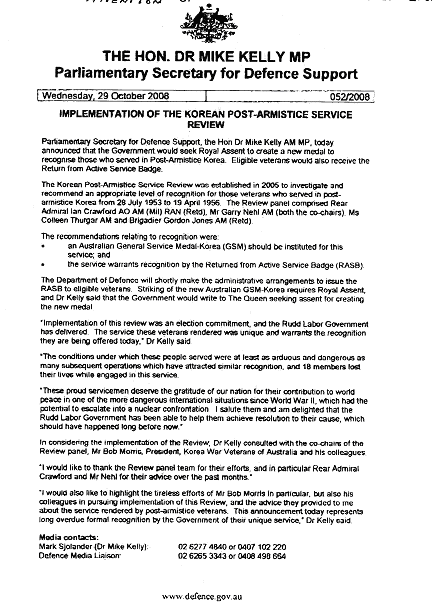
Attachment 2
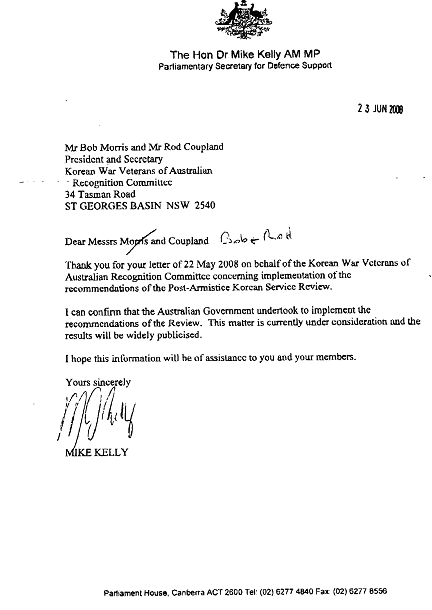
Attachment 3
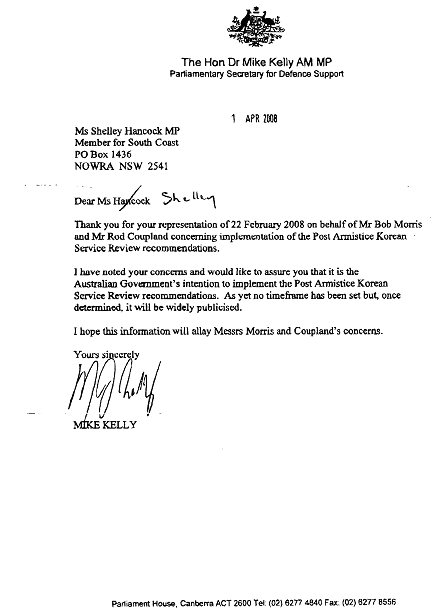
Attachment 4.1
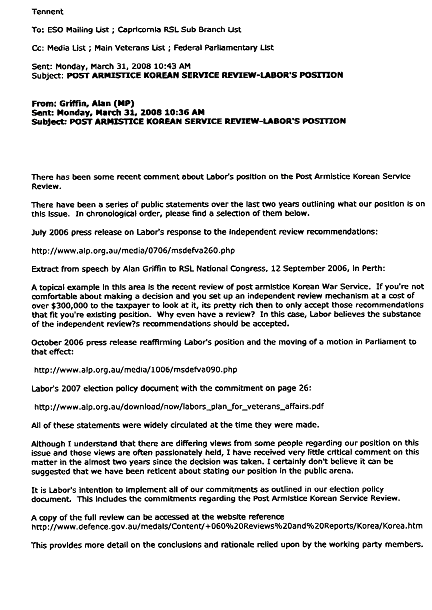
Attachment 4.2
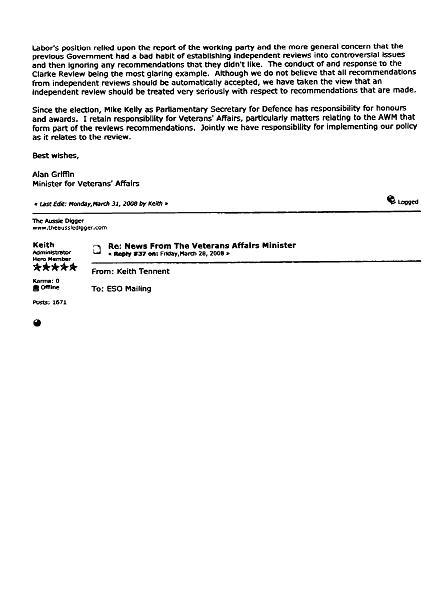
Attachment 5
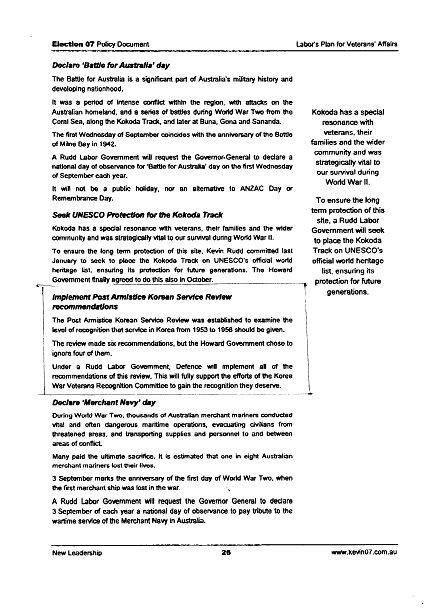
Attachment 6
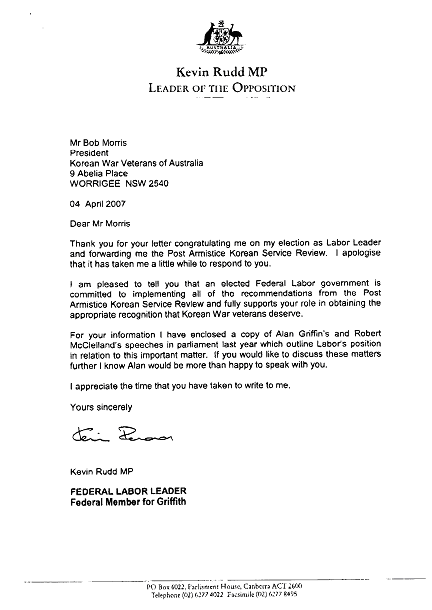
Attachment 7.1

Attachment 7.2

Attachment 7.3
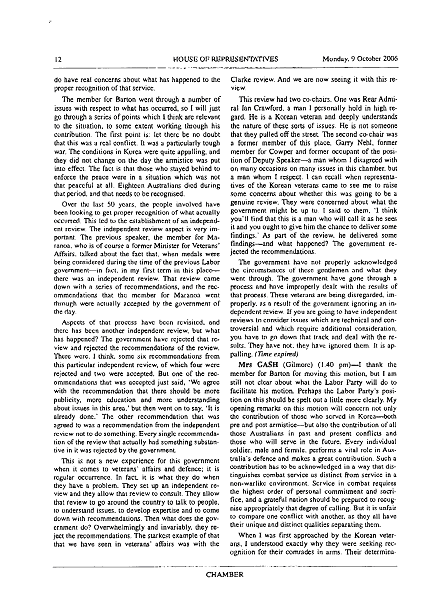
Attachment 7.4
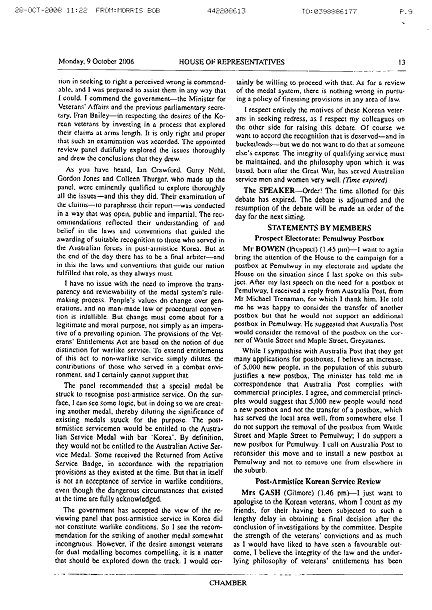
Attachment 8
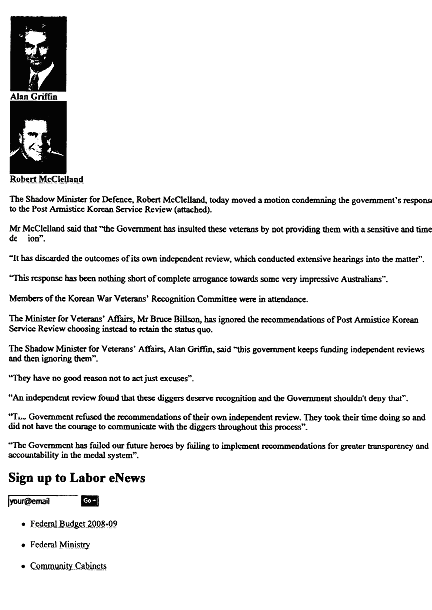
Attachment 9
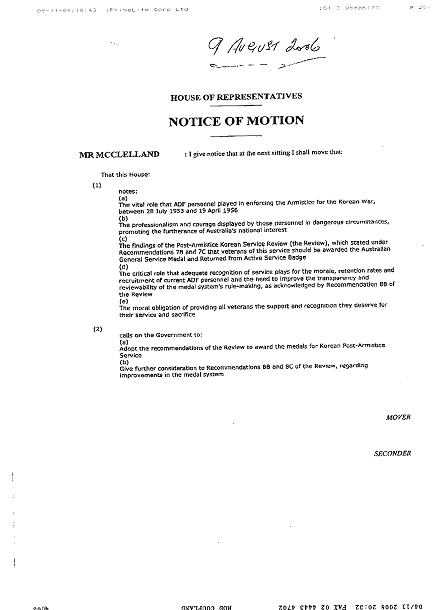
Attachment 10
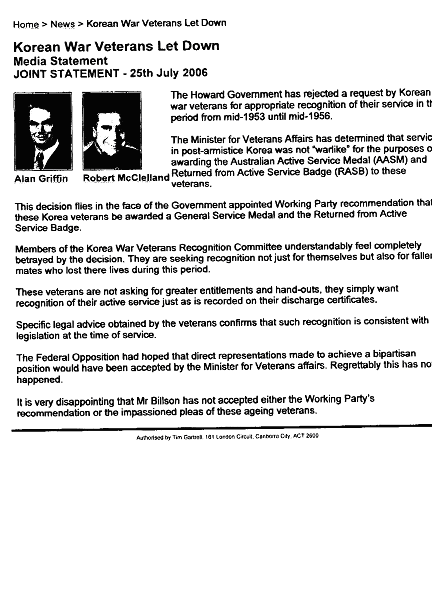
Attachment 11
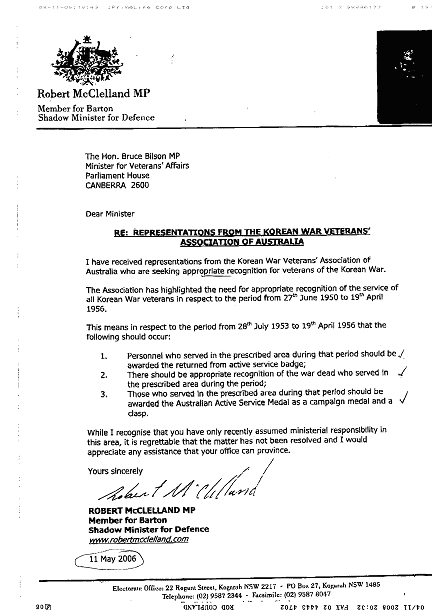
Attachment 12.1
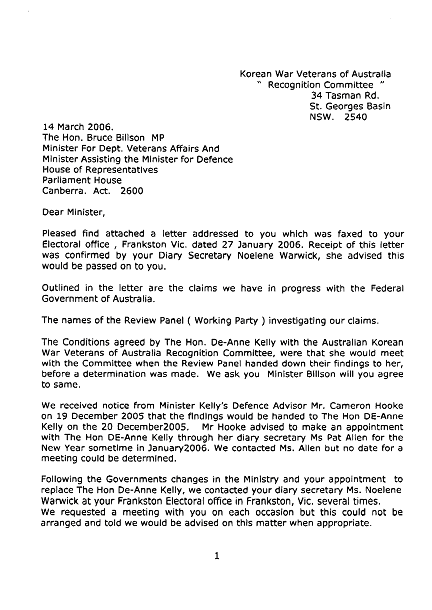
Attachment 12.2
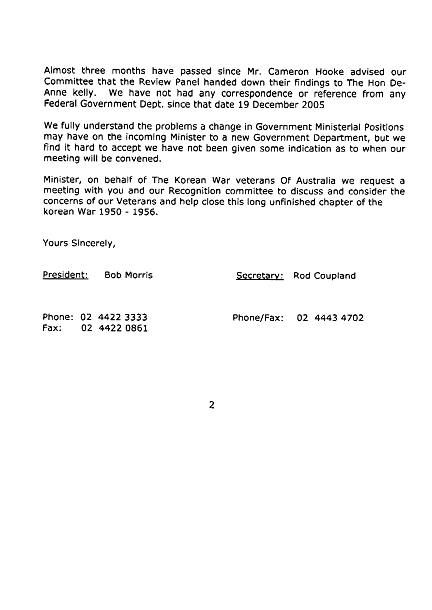
Attachment 12.3
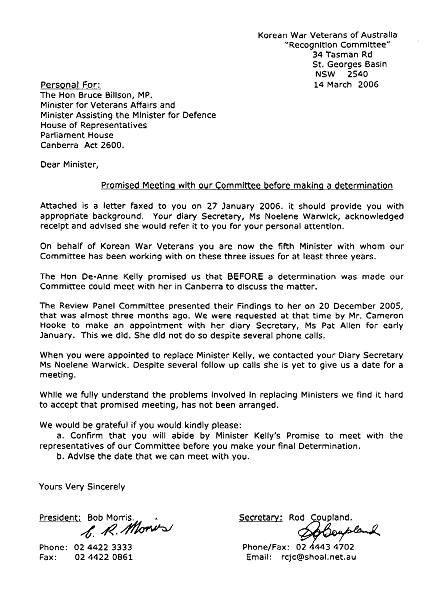
Attachment 13.1
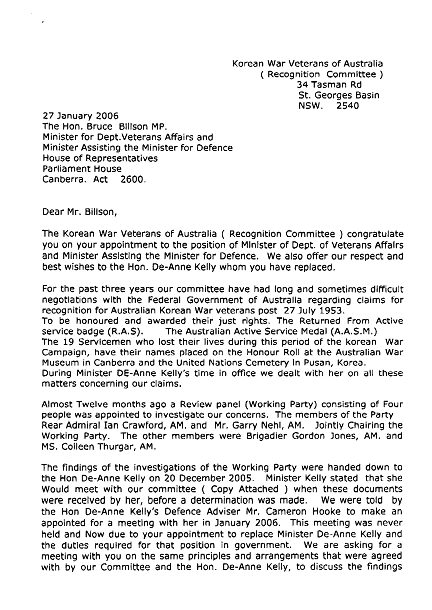
Attachment 13.2
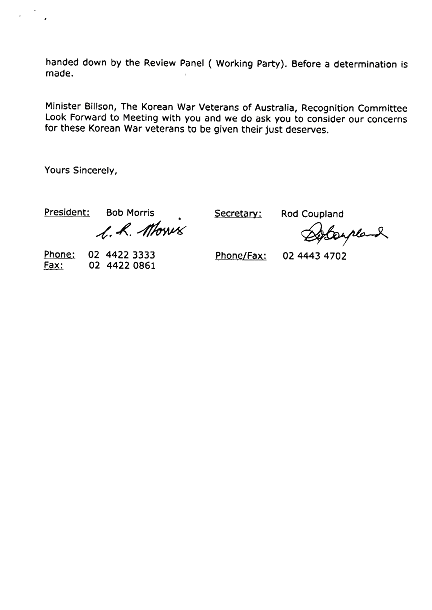
Attachment 14
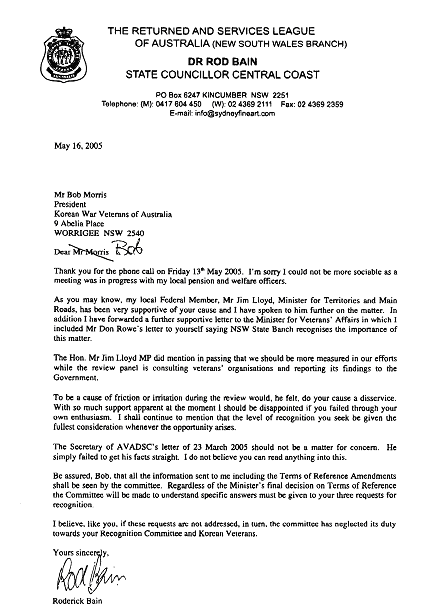
Attachment 15
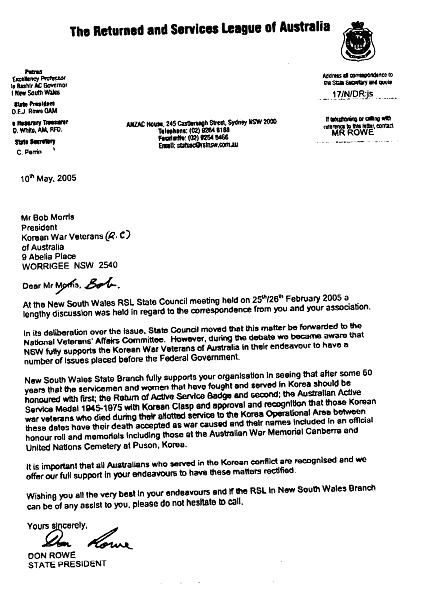
Attachment 16
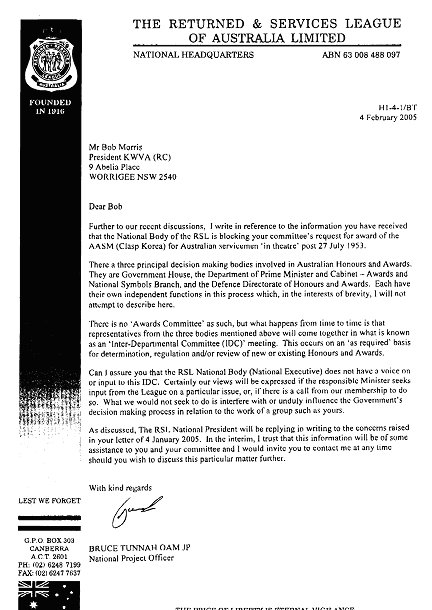
Attachment 17.1

Attachment 17.2
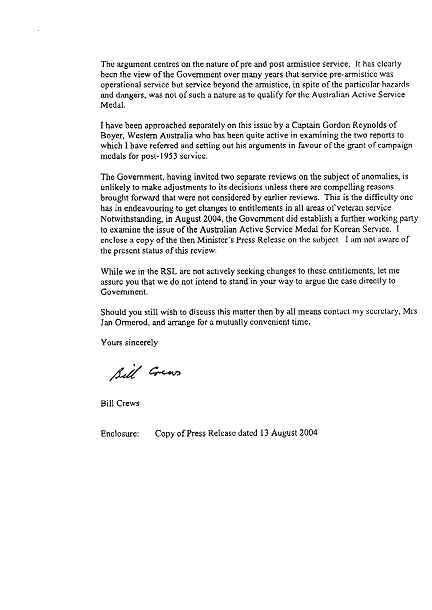
Attachment 18
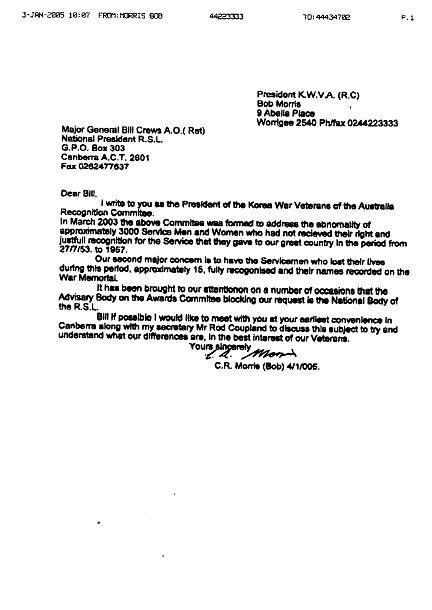
Dated 8/3/2009.
Go to top
Return to latest from Colonel Limburg
Return to Front Page
Return to Contents file
Return to OPs file